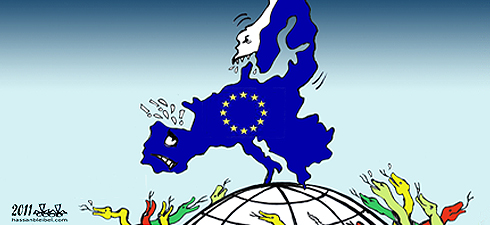We know that the Norwegians go their own way, that they vote consistently against joining the European Union, not just because they have a special advantage thanks to their natural resources which ensure them higher incomes, but because they have a more "isolationist” culture too: all the while looking towards Brussels, sitting in on the same debates about the single market, and always seeing the same images of leaders who shake hands, promise each other many things, and, on returning to their countries, find themselves stricken with amnesia and blame Brussels for their failures.
And so the Norwegians, a people who love things and decisions to be clear, correct and efficient, are asking: how to understand what is going on in Brussels? Seen this way, the massacre in Oslo and on the neighbouring island of Utøya is significant not only for Norway but for the EU as well. For Norway it ought to be a wake-up call indicating that it can no longer continue on its path of "splendid isolation" and that mechanical multilateralism can hardly compensate for accepting full participation in managing global interdependencies.
As for the EU member states and the EU institutions in Brussels in particular, these have a duty not to hesitate in building stronger and more effective European structures, which are needed not only following the lessons of the ongoing financial crisis but also in consequence of the serious fallout from the current political and moral crisis across our continent.
A wake-up call for Brussels
We are 27 states in the European Union – more than half a billion people within dozens of nations, speaking dozens of languages, with customs that are national, regional and local. Even the biggest nation in the EU is only a minority within the overall population of European citizens, each of which displays a diversity that remains one of the foundations of the European project set out on by Schuman and Monnet. It is true, however, that this diversity also holds a potential for conflict that must be properly handled. It's not for nothing that the European continent has the sad notoriety of having triggered the most devastating world wars of the past century. Now, early in the twenty-first century, we find that the whirlwind of globalisation, communication technologies, the free movement of goods and people, demographic trends and international migration has brought us the challenge of managing a diversity much broader than the “classical" European diversity.
This situation frequently leads to confusion, attitudes born of desperation, and dysfunctions not only at the institutional level but also in the lives of individuals. This is why the management of diversity must be a serious and everyday concern of governments and local authorities of the individual member states of the Union, and for the EU as well.
It was two years ago, at the conclusion of the Swedish Presidency of the EU, when "The Stockholm Programme” was adopted, a five-year programme dedicated to Justice and Home Affairs. One of the goals of the programme was to offer "comparable rights, responsibilities, and opportunities for all... taking into account the necessity of balancing migrants’ rights and duties”. The European Council in December 2009 then established a series of measures that member states were to apply. These, in turn, have developed into national and local strategies on integration, anti-racism and diversity management, the application of which was to have been monitored and evaluated.
Instead of seeing these strategies actually applied, we have witnessed a multiplication of nationalist and xenophobic discourses and a proliferation of certain political currents that were thought to have vanished. All in the name of democracy and even the strengthening of European identity! In Oslo, the alarm is also sounding for Brussels.
Was this article useful? If so we are delighted!
It is freely available because we believe that the right to free and independent information is essential for democracy. But this right is not guaranteed forever, and independence comes at a cost. We need your support in order to continue publishing independent, multilingual news for all Europeans.
Discover our subscription offers and their exclusive benefits and become a member of our community now!












